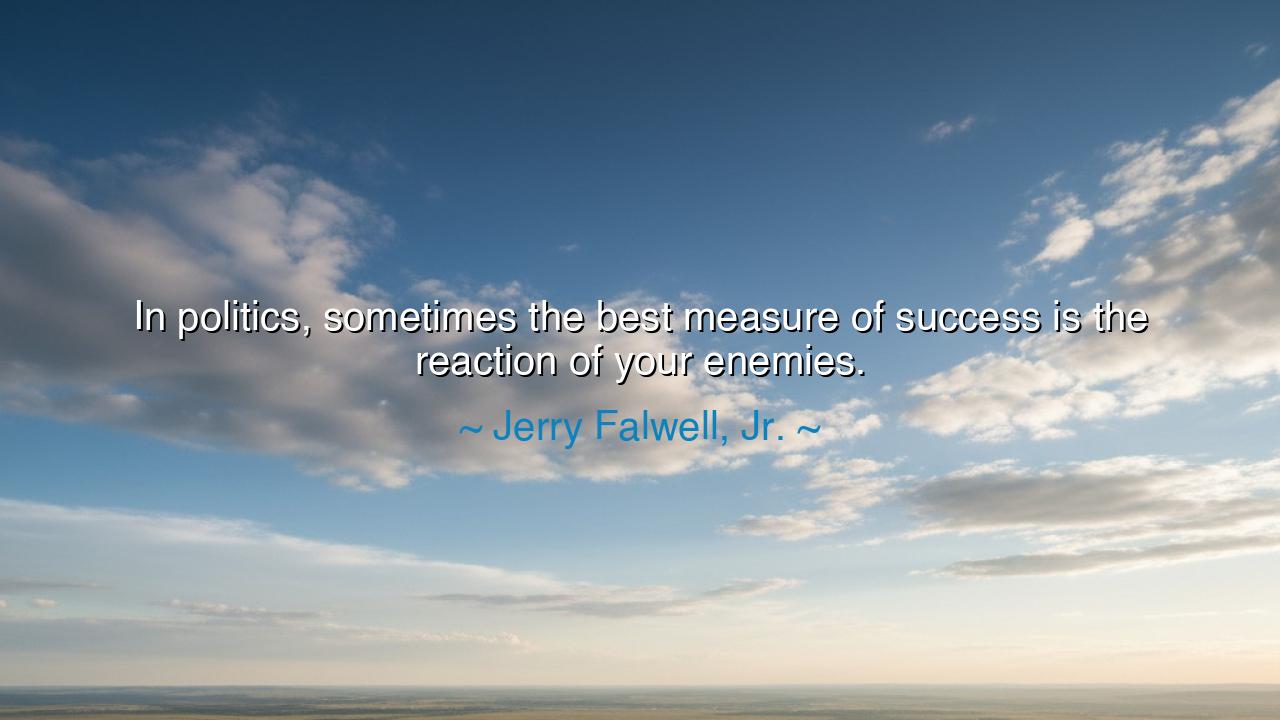
In politics, sometimes the best measure of success is the






Hear the words of Jerry Falwell, Jr., who declared: “In politics, sometimes the best measure of success is the reaction of your enemies.” Though spoken in the realm of politics, this truth shines far beyond it, for it touches the eternal struggle of power, influence, and the human spirit. In these words we learn that success is not always measured by applause, nor by the sweetness of praise, but often by the fury, the fear, and the unrest stirred in the hearts of those who oppose us. For the wrath of enemies is proof that your deeds carry weight, and that your steps have shaken the ground they once claimed as secure.
The ancients knew this lesson well. When a warrior entered the battlefield, he did not look for the cheers of his companions to know his strength, but for the trembling of his foes. If his enemies rallied with anger, if they cursed his name, it was a sign that his presence had pierced their defenses. So too in the political arena: when one’s actions stir opposition, when adversaries rise in protest, it often signals that true power has been exercised, that true change has begun to stir. The measure of impact is often the resistance it creates.
Consider the life of Abraham Lincoln, who faced not only fierce enemies in the South, but also harsh critics among his own allies. His enemies despised him so deeply that they seceded from the Union at his election. Their rage was not a sign of his weakness, but of his strength, for they feared the changes his leadership would bring—the weakening of slavery’s grip and the reshaping of the nation. Lincoln’s enemies proved his success; their anger was the shadow cast by the light of his purpose.
In contrast, the one who leaves no mark, who offends no adversary, may live in peace, but it is the peace of irrelevance. The enemy does not waste arrows on the harmless. The generals of old would say, “If your foe ignores you, you are not yet a threat.” Thus Falwell’s words remind us that sometimes the reaction of enemies is the truest sign that your path is righteous and your efforts effective.
Yet there is also danger in these words. For one must not mistake any opposition as a sign of greatness. Foolishness, cruelty, and injustice too will bring enemies, but their hatred is not a crown of honor—it is a mirror of your failure. The wisdom lies in discerning the cause: are your enemies enraged because you brought truth, justice, and progress? Or are they enraged because you spread harm? The reaction of enemies is a measure, but it must be weighed with the balance of conscience and the judgment of history.
To you who listen, take this lesson into your heart: do not be dismayed when you face resistance, nor lose heart when others rise against you. Ask instead: Why do they oppose me? If their rage springs from fear of justice, from resistance to truth, then take courage—you are on the right path. Let their anger be a signpost that you are shaking the old order and bringing forth the new. For silence from enemies often means you have accomplished nothing, but their loud cries prove that you have struck deeply.
Practical wisdom follows: in your work, in your art, in your struggle, expect opposition. Do not court it for its own sake, but do not shrink from it either. Measure your success not only in praise, but in the disruptions you cause to falsehood, injustice, or complacency. If enemies rise, let them rise, for their reaction is proof that you are not invisible. Stand firm, and know that the waves of resistance are often the surest evidence that your ship sails strong.
Thus remember Falwell’s truth: in politics, as in life, sometimes the clearest sign of victory is not the song of allies, but the groaning of foes. Walk boldly, do the work that must be done, and when enemies rage, smile—for in their fury, you will see the shadow of your own success.






AAdministratorAdministrator
Welcome, honored guests. Please leave a comment, we will respond soon